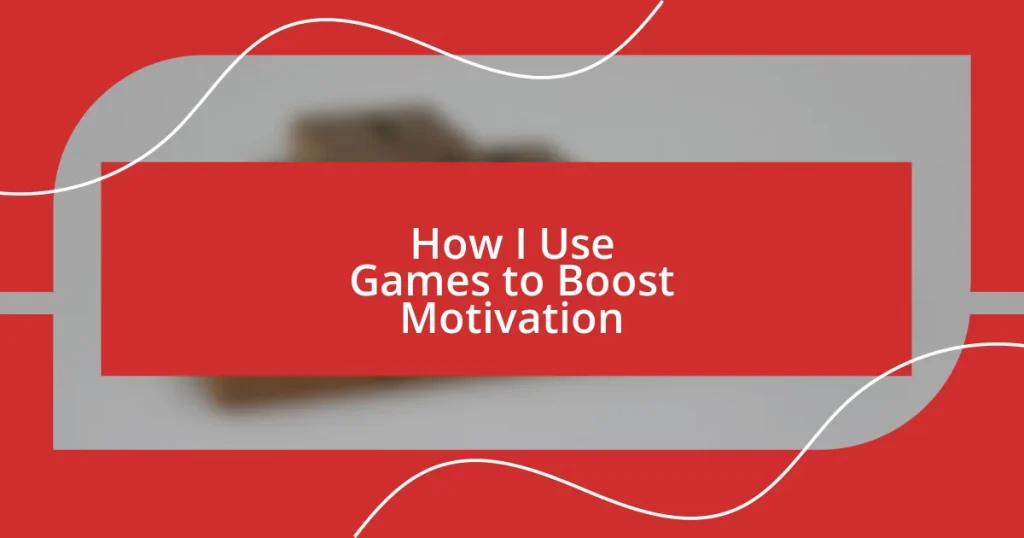Key takeaways:
- Game mechanics, including clear goals, feedback loops, and rewards, significantly enhance motivation and engagement in both gaming and daily tasks.
- Gamification transforms mundane tasks into appealing challenges, fostering community interaction and visual progress tracking, which cater to various learning styles.
- Celebrating achievements and setting personalized goals creates a deeper emotional connection, making tasks feel more engaging and rewarding.
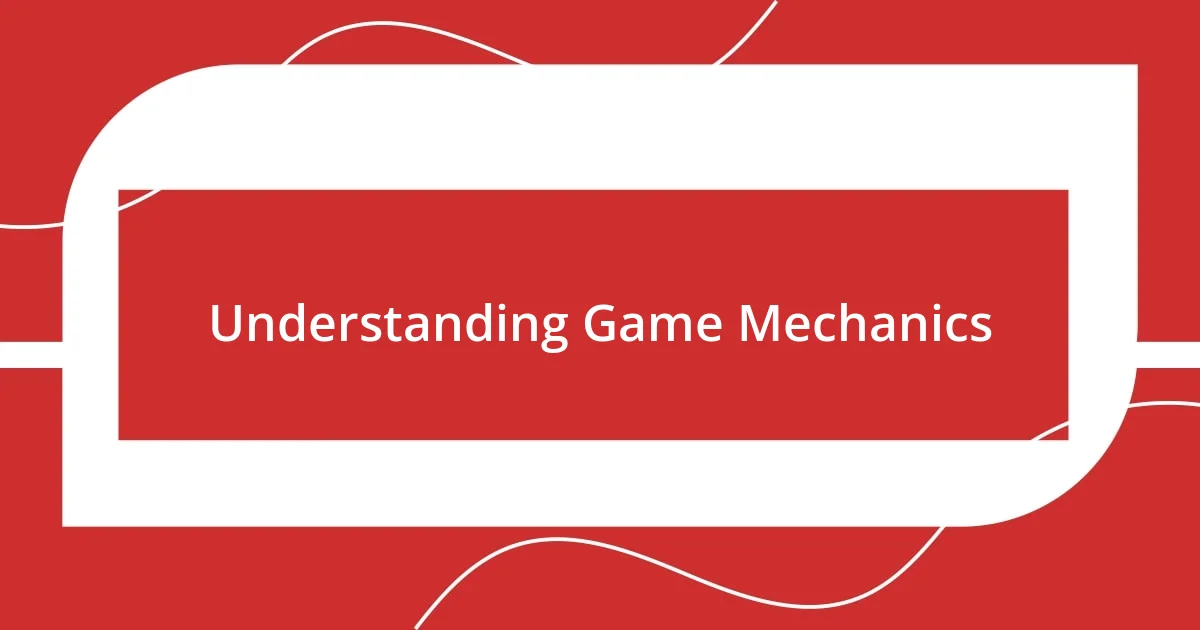
Understanding Game Mechanics
One of the most fascinating aspects of game mechanics is their ability to create a sense of progress. I remember playing a role-playing game where each quest felt like a building block. Completing tasks not only unlocked new abilities but also boosted my confidence. Isn’t it incredible how small achievements can stack up to create a feeling of substantial growth?
Another key element is feedback loops. In my experience, instant feedback can be a game-changer. For instance, when I successfully solve a puzzle, the immediate reward—a burst of points or a visual cue—reinforces my desire to tackle the next challenge. This raises an interesting question: do you find that immediate rewards motivate you more effectively than long-term goals?
Moreover, the concept of challenges and rewards is essential in maintaining engagement. I recall a time when I was stuck on a particularly tough level. The thrill of finally overcoming it led to such an adrenaline rush! It makes me wonder, how often do we mimic that feeling in our daily tasks? Engaging with challenging activities that offer rewarding experiences can be incredibly motivating, and I find this principle applies not just in gaming but in everyday life as well.
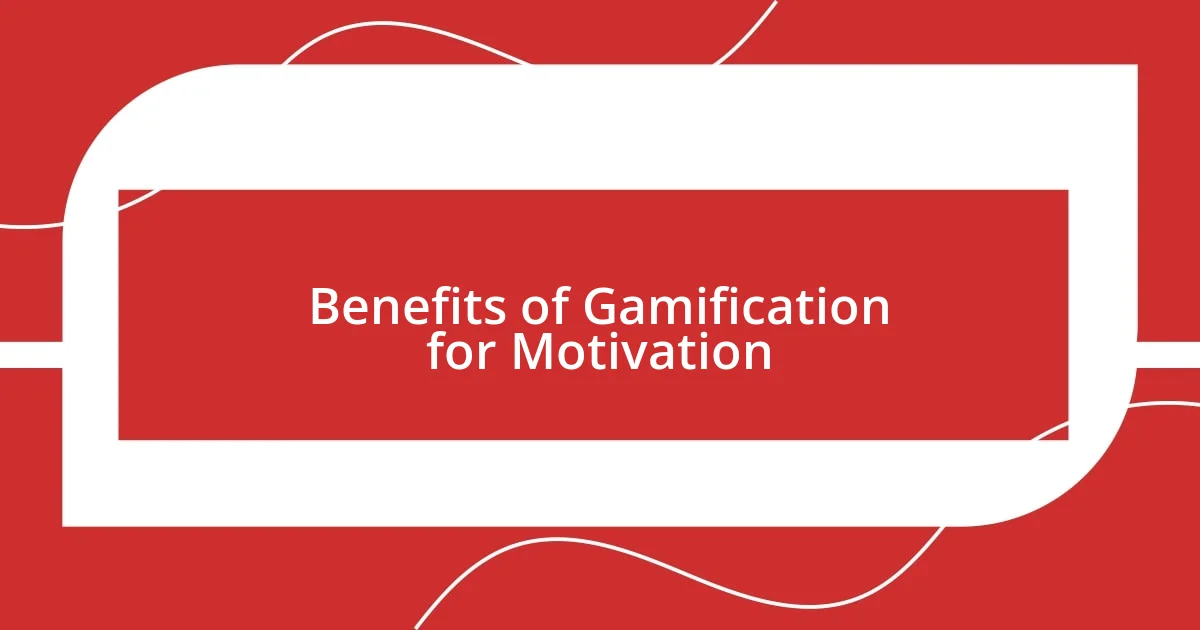
Benefits of Gamification for Motivation
Gamification significantly enhances motivation by transforming mundane tasks into engaging challenges. I remember participating in a wellness app that used gamification to encourage healthier habits. Each time I logged my meals or exercised, I earned points and badges, which felt rewarding and drove me to make better choices. Does it surprise you how something as simple as points can make commitment feel playful and motivating?
Another benefit of gamification is the element of community. Many games foster social interaction, and I’ve observed that sharing achievements with friends makes the experience more enjoyable. When we compete or collaborate, it nurtures a spirit of camaraderie that can be extremely motivating. Have you ever felt the boost that comes from discussing your progress with a friend, pushing each other to reach new heights?
Incorporating gamification can also cater to different learning styles. I thrive when I can visualize my progress and, when a task is structured like a game, I feel drawn to it. For instance, using apps that display progress bars has helped me tackle big projects, making them feel less daunting. Isn’t it amazing how seeing clear milestones can affect not just motivation, but also our approach to challenges?
| Benefit | Description |
|---|---|
| Progress Tracking | Encourages engagement by visualizing achievements and growth. |
| Instant Feedback | Provides immediate rewards that reinforce positive behavior, fostering a desire to continue. |
| Community Engagement | Fosters social interaction, enhancing motivation through shared experiences and competition. |
| Convenient Learning Styles | Accommodates various preferences, making tasks feel achievable and enjoyable. |
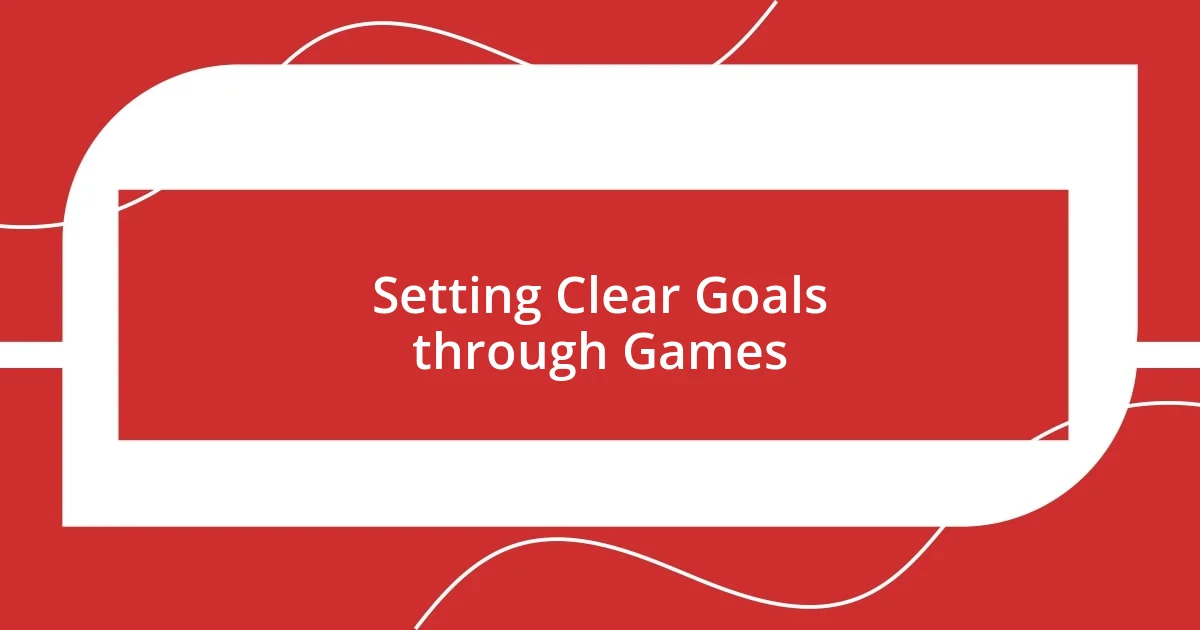
Setting Clear Goals through Games

Setting Clear Goals through Games
When I dive into a game, the first thing that draws me in is often the clarity of its objectives. I’ve spent countless hours playing strategy games where each level presents clear, measurable goals. Achieving these goals not only provides a sense of direction but also elevates my sense of accomplishment. Have you ever noticed how focusing on specific tasks enhances your engagement and motivation?
Incorporating game-like goals into my daily routine has transformed how I view tasks. For example, when I was tackling a long-term project, I broke it down into smaller tasks—much like quests in a game. Each completed task felt like leveling up, and that excitement kept me going. Here’s how I like to structure goals inspired by gaming:
- Define Clear Objectives: Just like in games, knowing what to achieve helps maintain focus.
- Use Progress Markers: Breaking tasks into smaller segments allows me to celebrate mini-achievements along the way.
- Reward Myself: Setting up rewards for completion not only motivates but also makes the process enjoyable.
- Visualize Progress: I find that using charts or graphs to track my progress fuels my desire to keep pushing forward.
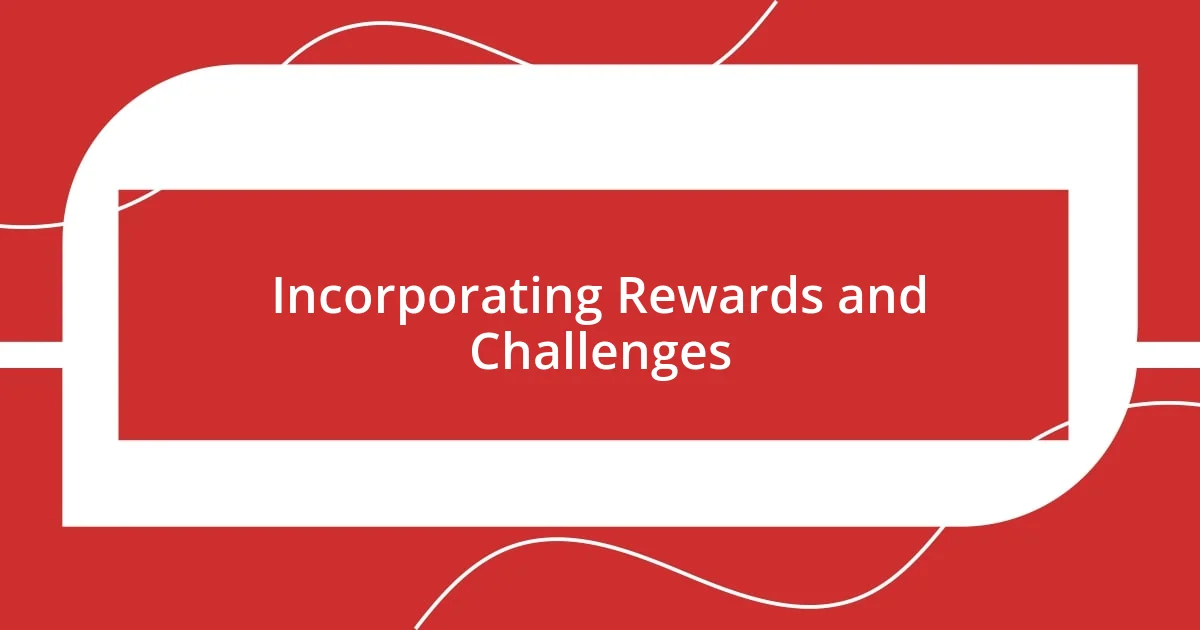
Incorporating Rewards and Challenges
Incorporating rewards and challenges into my routine feels like tapping into a secret motivator. I remember setting up a personal reward system for completing mundane tasks, where I’d treat myself to a favorite snack or some leisure time after finishing. It’s fascinating how a simple treat can transform the task from a chore into something to look forward to, don’t you think?
Challenges play a pivotal role too. I once decided to create a month-long fitness challenge where I aimed to run a certain distance each week. Each time I hit the target, I rewarded myself with new workout gear. The thrill of overcoming that challenge was not just in the achievement but also in the excitement of the treats that awaited me. The relationship between the challenge and reward made every step feel like progress towards something greater.
What I love most is the psychological boost that comes from this gamified approach. Turning tasks into competitive challenges—against myself or even friends—adds an exciting layer of engagement. I often set up informal competitions with my partner, where we track our daily activities via an app. Have you ever tried competing with someone? It cultivates a friendly tension that propels me to keep pushing my boundaries.
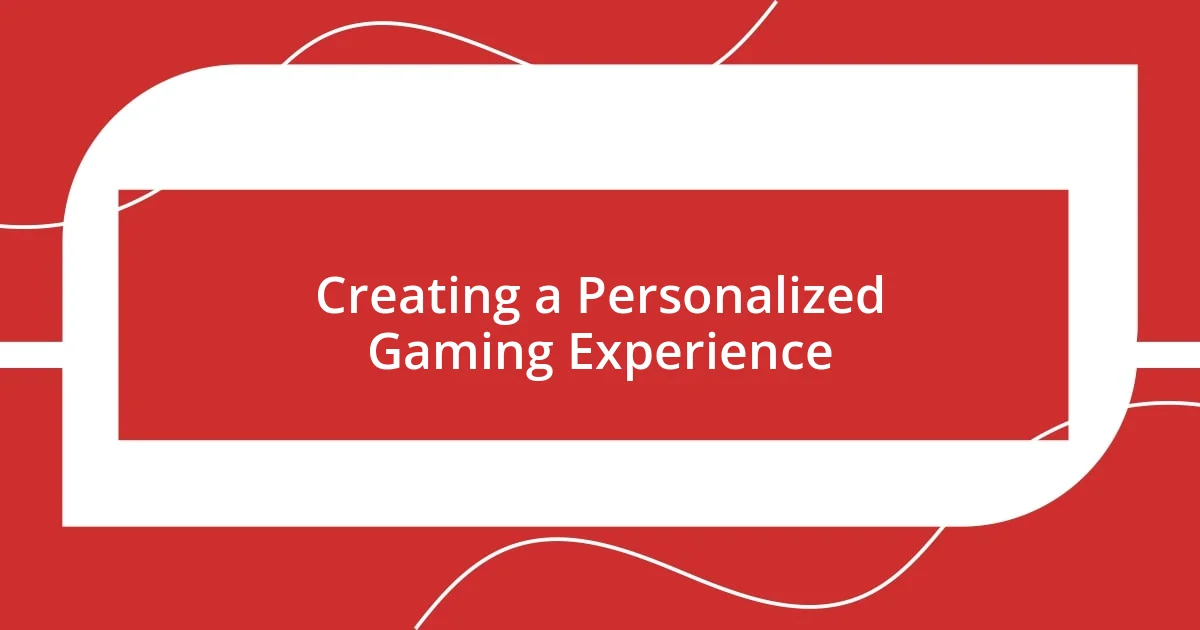
Creating a Personalized Gaming Experience
Creating a personalized gaming experience has been a game-changer for me when it comes to motivation. I remember customizing the character in my favorite RPG; this simple act made the game feel uniquely mine and heightened my emotional connection to the storyline. Have you ever felt that spark when you truly put your personal touch on something? It’s like you’re not just a player anymore; you become a part of the narrative.
What I find particularly effective is tailoring my gaming goals to align with my personal interests. For instance, I once designed a daily challenge that mirrored my favorite game mechanics. Each morning, I’d tackle an activity—like learning a new skill—structured as if it were a quest. Completing the challenge often left me feeling accomplished, as if I had defeated a formidable boss. This fusion of my interests with gameplay elements not only motivates me but also enhances my daily experiences. Isn’t it amazing how making something uniquely yours can transform it into something more engaging?
Lastly, I’ve noticed that incorporating feedback and metrics into my gaming approach adds depth to my experiences. I use apps that track my progress in various tasks, much like a game would display stats or rankings. Seeing improvement over time—whether in fitness or productivity—fuels my desire to keep going. I often reflect on how those numbers bring a sense of accountability and motivation. Don’t you think having something tangible to measure makes the journey more rewarding?
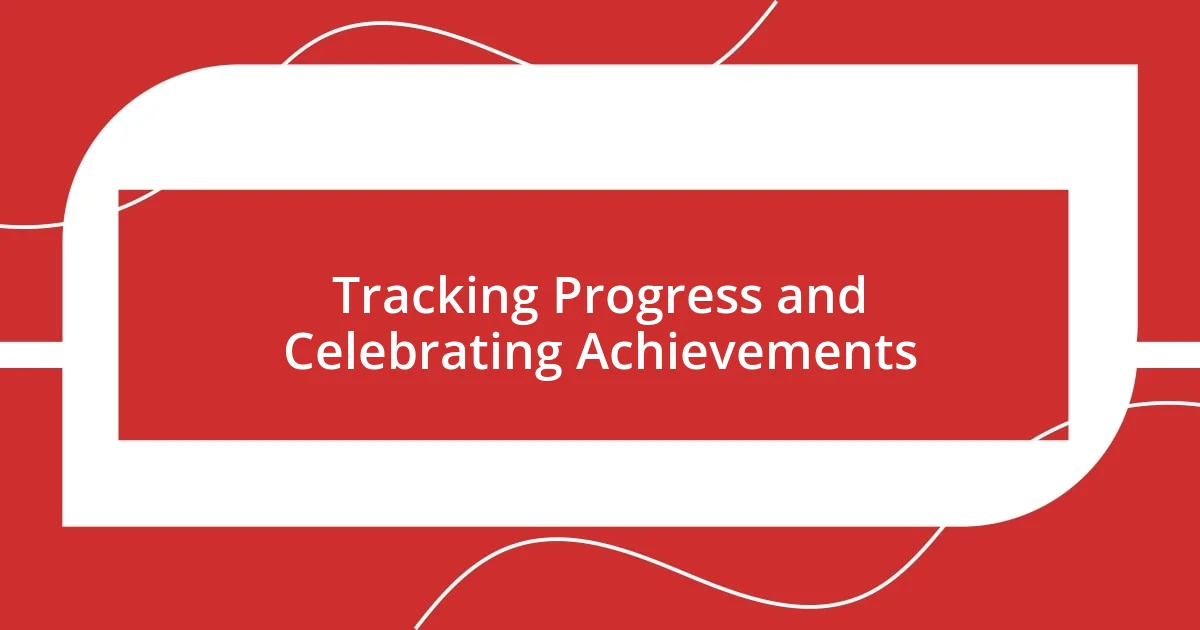
Tracking Progress and Celebrating Achievements
Tracking progress has become an integral part of how I stay motivated. I often utilize apps that provide visual representations of my goals, like bar charts or progress circles. It’s quite rewarding to see that slice of success grow larger over time, isn’t it? Each tick of the progress meter is like a mini-celebration, reinforcing that I’m heading in the right direction.
Celebrating achievements, big or small, also plays a vital role in my routine. I recall the time I successfully completed a challenging online course. I didn’t just let it slide by; I organized a little celebration with friends. We had a themed dinner where I even shared what I learned. The joy and sense of accomplishment I felt that day helped cement the importance of recognizing and sharing our wins. It’s like throwing confetti in the air for yourself—don’t you think we should all do that more often?
Sometimes, I create milestone rewards that truly resonate with me, serving as a powerful motivator. When I reached a significant fitness goal recently, I treated myself to an adventure day, trying out something I had always wanted to do—rock climbing! The thrill of ticking off that bucket list item was enhanced by knowing it was a direct result of my hard work. Why not turn our achievements into opportunities for new experiences? It’s a fantastic way to keep the excitement alive.









